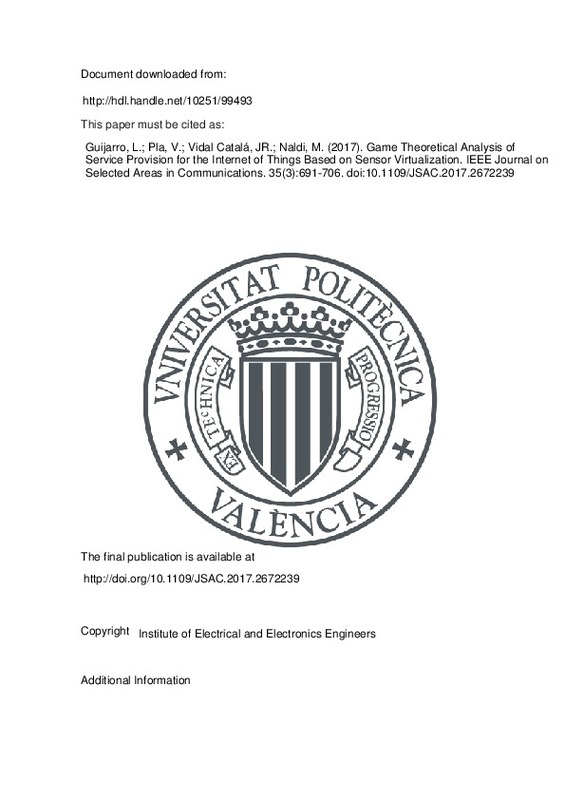JavaScript is disabled for your browser. Some features of this site may not work without it.
Buscar en RiuNet
Listar
Mi cuenta
Estadísticas
Ayuda RiuNet
Admin. UPV
Game Theoretical Analysis of Service Provision for the Internet of Things Based on Sensor Virtualization
Mostrar el registro sencillo del ítem
Ficheros en el ítem
| dc.contributor.author | Guijarro, Luis
|
es_ES |
| dc.contributor.author | Pla, Vicent
|
es_ES |
| dc.contributor.author | Vidal Catalá, José Ramón
|
es_ES |
| dc.contributor.author | Naldi, Maurizio
|
es_ES |
| dc.date.accessioned | 2018-03-18T05:19:52Z | |
| dc.date.available | 2018-03-18T05:19:52Z | |
| dc.date.issued | 2017 | es_ES |
| dc.identifier.issn | 0733-8716 | es_ES |
| dc.identifier.uri | http://hdl.handle.net/10251/99493 | |
| dc.description.abstract | [EN] The advent of the Internet of Things (IoT) is expected to bring major benefits to a wide range of areas. However, the successful deployment of the IoT calls for the existence of sustainable and well-understood business models. In this paper, we propose and analyze a business model for a likely scenario in the IoT, which is made up of WSNs, service providers and users. The service providers compete against each other in the intermediation between the virtualized WSNs and the users that benefit from enhanced services built on the sensed data. The service providers pay to the WSNs for the data and charge the users for the service. The model is analyzed by applying oligopoly theory and game theory, the conditions for the existence and uniqueness of the Nash equilibrium are established, and the equilibrium and the social optimum are obtained. Our results show that the business model is sustainable, provided that the users¿ sensitivity to the value-to-price ratio is not negligible and, in this situation, the number of active service providers is upper bounded by a value that depends on the sensitivity and the market size. Furthermore, the operation of such a market is shown to efficiently use the information provided by the WSNs, and, when compared to the social optimum, to produce an increase in users¿ and service providers¿ surpluses, but a reduction in WSNs¿ surplus. | es_ES |
| dc.description.sponsorship | This work was supported by the Spanish Ministry of Economy and Competitiveness under Project TIN2013-47272-C2-1-R. | en_EN |
| dc.language | Inglés | es_ES |
| dc.publisher | Institute of Electrical and Electronics Engineers | es_ES |
| dc.relation.ispartof | IEEE Journal on Selected Areas in Communications | es_ES |
| dc.rights | Reserva de todos los derechos | es_ES |
| dc.subject | Game theory | es_ES |
| dc.subject | Service provision | es_ES |
| dc.subject | Wireless sensor networks | es_ES |
| dc.subject | Oligopoly | es_ES |
| dc.subject | Social welfare | es_ES |
| dc.subject.classification | INGENIERIA TELEMATICA | es_ES |
| dc.title | Game Theoretical Analysis of Service Provision for the Internet of Things Based on Sensor Virtualization | es_ES |
| dc.type | Artículo | es_ES |
| dc.identifier.doi | 10.1109/JSAC.2017.2672239 | es_ES |
| dc.relation.projectID | info:eu-repo/grantAgreement/MINECO//TIN2013-47272-C2-1-R/ES/PLATAFORMA DE SERVICIOS PARA CIUDADES INTELIGENTES CON REDES M2M DENSAS/ | es_ES |
| dc.rights.accessRights | Abierto | es_ES |
| dc.contributor.affiliation | Universitat Politècnica de València. Departamento de Comunicaciones - Departament de Comunicacions | es_ES |
| dc.description.bibliographicCitation | Guijarro, L.; Pla, V.; Vidal Catalá, JR.; Naldi, M. (2017). Game Theoretical Analysis of Service Provision for the Internet of Things Based on Sensor Virtualization. IEEE Journal on Selected Areas in Communications. 35(3):691-706. https://doi.org/10.1109/JSAC.2017.2672239 | es_ES |
| dc.description.accrualMethod | S | es_ES |
| dc.relation.publisherversion | http://doi.org/10.1109/JSAC.2017.2672239 | es_ES |
| dc.description.upvformatpinicio | 691 | es_ES |
| dc.description.upvformatpfin | 706 | es_ES |
| dc.type.version | info:eu-repo/semantics/publishedVersion | es_ES |
| dc.description.volume | 35 | es_ES |
| dc.description.issue | 3 | es_ES |
| dc.relation.pasarela | S\324889 | es_ES |
| dc.contributor.funder | Ministerio de Economía, Industria y Competitividad | es_ES |







![[Cerrado]](/themes/UPV/images/candado.png)

